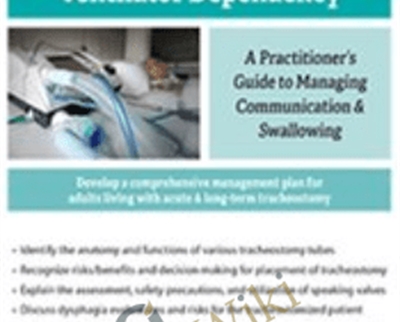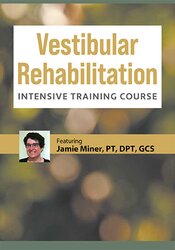Unlock Expert Knowledge: Discover the Premium Caring For Patients with Tracheostomy & Ventilator Dependency: A Practitioners Guide to Managing Communication and Swallowing – Jerome Quellier Course Exclusively at GBESY. Elevate your skills and achieve career success by learning from world-renowned instructors and industry experts through our extensive library of premium self-paced courses.
 Develop a Comprehensive Management Plan for Adults Living with Acute & Long–Term Tracheostomy
Develop a Comprehensive Management Plan for Adults Living with Acute & Long–Term Tracheostomy
Caring For Patients with Tracheostomy & Ventilator Dependency: A Practitioners Guide to Managing Communication and Swallowing by Jerome Quellier,
Salepage link: At HERE. Archive:
Develop a Comprehensive Management Plan for Adults Living with Acute & Long–Term Tracheostomy
As medical technology and intervention evolves, more patients are faced with temporary and long–term tracheostomy/ventilation as a part of their recovery. The very presence of a tracheostomy tube may elicit visceral reaction to secretion management and dehumanize the patient who is unable to exercise their decision making capacity, orally communicate their needs, and interact socially with staff or family.
Practitioners in acute hospitals, transitional rehabilitation units, skilled long–term settings, and homecare arenas are challenged to not only understand the basic functionality of a tracheostomy tube, but complete daily cares, assist their patients with swallowing and oral communication, and even train non-medical care providers. Management of the tracheostomized patient is often assumed to be complex. This misconception may become a barrier for placement in an environment most conducive to overall rehabilitation; to foster social closeness with staff, friends and family; and ultimately result in prolonging the weaning process.
This recording will outline and compare the basic components of a tracheostomy tube, decision making surrounding the most appropriate type of tube to use for various populations, and the risks/benefits of placement. Through review of daily cares, the assessment and placement of a speaking valve, and dysphagia characteristics for this population, you will build the skills and confidence necessary to develop a comprehensive management plan. Finish this recording with a solid foundation of general knowledge, critical thinking algorithms, and an understanding of the roles and responsibilities of their specialty when faced with tracheostomized patients.
- Review the components to various tracheostomy tubes available and their functions
- Discuss the decision making process for placement of a tracheostomy tube and the advantages/disadvantages to short- and long-term placement
- Review basic daily nursing cares necessary for maintaining a tracheostomy
- Explain the assessment, safety precautions, and utilization of speaking valves
- Discuss assessment and treatment of swallowing and the application of a speaking valve to minimize aspiration risks and maximize oral communication including bedside screening vs. formal assessment
- Develop a plan of care and establish professional responsibilities across a multidisciplinary team to manage safe swallowing and maintain verbal communication
ANATOMY AND PHYSIOLOGY OF TRACHEOSTOMY
- Definition of terminology used
- Surgical vs. Percutaneous Tracheostomy
CLINICAL FEATURES OF A TRACHEOSTOMY TUBE INTUBATION AND TRACHEOSTOMY – BENEFITS AND RISKS
- Endotracheal tube advantages/disadvantages
- Tracheostomy tube advantages/disadvantages
SIZING TRACHEOSTOMY TUBES
MANUFACTURERS OF TRACHEOSTOMY TUBES
SPECIAL CONSIDERATIONS OF MANAGING A TRACHEOSTOMY TUBE
- Cuff pressures
- Essential daily cares
- Necessary supplies
- Cannula cleaning/exchanging
- Maintaining stoma and skin integrity
- Minimal Leak technique vs. minimal occlusive volume
SPEAKING VALVES
- Anatomy & physiology of common speaking tubes
- Population and timing
- Warning/Precautions
- Assessment and placement guidelines
- Trouble shooting during valve assessment/use
- Ventilator modifications for safety and success
- Inline speaking valves
- Decision making for the respiratory therapists
- Tidal volumes
- Peak inspiratory pressures
- Minimal vent parameters to facilitate successful application
FENESTRATED TRACHEOSTOMY TUBES
DYSPHAGIA AND THE TRACHEOTOMIZED PATIENT
- Post extubation consideration
- Effect of tracheostomy on swallowing
- Effect of cervical bracing on tracheotomized patient
- Assessment of swallowing
- Blue Dye vs. Fees vs. MBSS
- Impact of speaking valve upon swallowing
MULTIDISCIPLINARY CARE OF A PATIENT WITH TRACHEOSTOMY
- Role of SLP, nurse, and respiratory therapist
- Review a sample of policy/procedure
Unlock Expert Knowledge with the Caring For Patients with Tracheostomy & Ventilator Dependency: A Practitioners Guide to Managing Communication and Swallowing – Jerome Quellier Course on GBESY.
Access over 70,000 premium learning programs curated by leading experts and renowned authors at GBESY. Our Caring For Patients with Tracheostomy & Ventilator Dependency: A Practitioners Guide to Managing Communication and Swallowing – Jerome Quellier course provides actionable knowledge and real-world skills through:
- Expert Authors: Learn from renowned figures like John Overdurf, Conor Harris, Samir Kahlot, and more.
- Flexible Learning: Enjoy self-paced study for ultimate convenience.
- Comprehensive Resources: Benefit from detailed manuals and step-by-step guidance.
- Lifetime Access: Get ongoing learning with free updates.
- Secure Purchase: Your transactions are protected with 256-bit AES encryption and verified payment gateways (PayPal, Stripe).
- Instant Download: Access your Caring For Patients with Tracheostomy & Ventilator Dependency: A Practitioners Guide to Managing Communication and Swallowing – Jerome Quellier course immediately after payment from your account dashboard or via email. Learn on any device.
![GBesy [GB] GBesy [GB]](https://gbesy.biz/wp-content/uploads/2023/05/gbesy-Logo-full-100.png)
![GBesy [GB] GBesy [GB]](https://www.gbesy.com/wp-content/uploads/2023/05/gbesy-Logo-full-100.png)



 Purchase this course you will earn
Purchase this course you will earn 





Reviews
There are no reviews yet.